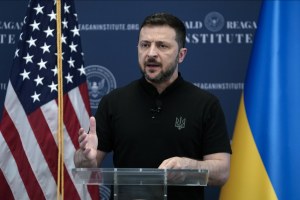While opinion leaders across party lines—as well as Democrats and Independents among the public—support continued assistance to Kyiv, everyday Republicans stand out in their opposition.
Perhaps no other international issue hangs more precariously on the presidential transition from Joe Biden to Donald Trump than the situation in Ukraine. After a recent trilateral meeting with French President Emmanuel Macron and Ukrainian President Volodymyr Zelenskyy, President-elect Trump called for a ceasefire between Russia and Ukraine and said he is “formulating a concept of how to end that ridiculous war.”
Results from a recent Chicago Council on Global Affairs-University of Texas survey of foreign policy experts and the 2024 Chicago Council Survey of the general public show widespread support for continuing economic and military assistance to Ukraine. The main pocket of opposition revealed by these data is the Republican public. Their outlier views suggest that America Firsters’ hostility toward Ukraine and Trump’s characterization of Zelenskyy as “the greatest salesman on earth” may have eclipsed alternative messages in influencing GOP public opinion.
Key Findings
- Large majorities of foreign policy opinion leaders across party lines favor sending economic (97% of Democrats, 81% of Independents, and 73% of Republicans) and military (94% of Democrats, 85% of Republicans, and 76% of Independents) assistance to Ukraine.
- Among the public, a solid majority of Democrats and a smaller majority of Independents also support sustaining this aid, while a majority of GOP supporters continue to oppose assisting Kyiv.
- Solid majorities among opinion leaders and the general public support increasing diplomatic and economic sanctions against Russia for its invasion but oppose sending US troops to help Kyiv defend itself against Moscow.
Foreign Policy Opinion Leaders Back Continued Economic and Military Support for Ukraine
While the world awaits the next Trump administration’s strategy for ending the war in Ukraine, a range of potential plans have been floated, including continued US aid to Ukraine only if Kyiv agrees to enter into peace negotiations with the Kremlin; freezing the battle lines where they are and ceding territory to Russia; creating “autonomous zones” in eastern Ukraine; and increasing assistance to Kyiv if Putin refuses to negotiate.
For their part, US foreign policy professionals—including congressional and government staffers, think tank experts, academics, business leaders, media professionals, nongovernmental organization staff, and religious leaders—and the American public overall support continuing aid to Kyiv. Among the expert sample, this support spans political affiliations. Like most Republicans on Capitol Hill, a majority of Republican opinion leaders join Democrats and Independents in backing this assistance. Large majorities of foreign policy opinion leaders across party lines favor providing economic assistance to Ukraine (97% of Democrats, 81% of Independents, and 73% of Republicans). Similarly, large majorities favor sending additional arms and military supplies to Kiev (94% of Democrats, 85% of Republicans, and 76% of Independents).
The public also supports providing economic (58%) and military (57%) aid to Ukraine, but with greater partisan divisions. Among the public, Democrats have been the most consistently supportive since the start of the war, and seven in 10 continue to support both types of aid (71% military, 72% economic). A smaller majority of Independents also continue to back this support to Kiev (57% economic, 54% military). By contrast, a majority of Republicans now oppose continued military (51% oppose, 45% support) and economic assistance (51% oppose, 45% support) despite initially supporting it following the Russian invasion in 2022. While these views make Republican members of the public outliers in views regarding aid to Ukraine, it is also notable that more than four out of 10 self-described Republicans among the public continue to support assistance to Ukraine despite prominent calls over the past two years by Vice President-elect JD Vance and some other influential leaders of the MAGA movement to end US support for the country.
On other policy options, there is widespread agreement among opinion leaders and the public. Large majorities of leaders across the political spectrum (93% of Democrats, 92% of Republicans, and 79% of Independents) support increasing diplomatic and economic sanctions against Russia for its invasion. The public agrees: seven in 10 Americans overall (69%) and majorities of Democrats (77%), Republicans (66%), and Independents (63%) similarly favor increased economic and diplomatic pressure on Moscow.
Leaders and the public are also agreed on what the United States should not do: namely, send US troops to Ukraine to help the Ukrainian government defend itself from Russia’s attack. Fewer than a quarter of leaders would favor sending US troops to Ukraine (25% Independents, 20% Democrats, 17% Republicans). The policy is more popular among the American public, with just 29 percent of Americans overall in support (including 36% of Democrats, 26% of Independents, and 23% of Republicans).
Conclusion
Overall, support for Ukraine remains strong among US foreign policy professionals, including Democratic, Republican, and Independent opinion leaders. However, public views of aid to Ukraine are less consistently positive, as a majority of GOP supporters among the public oppose providing further assistance to the country. This constellation of attitudes suggests that if the United States considers providing Ukraine with a new aid package during the coming year, a gap may separate Republican foreign policy professionals from most GOP voters.
Trump, for his part, has been vague about whether he intends to continue providing aid to Ukraine when he takes office again in January. Trump met with Zelenskyy in Paris in early December and pressed for a ceasefire. Outgoing President Biden has accelerated US assistance to Ukraine in his final days in office, including $20 billion, the US portion of a multilateral $50 billion loan, which is backed by frozen Russian assets. It is unclear to what extent this commitment and others from the Biden administration will limit the incoming administration’s ability to affect the battlefield. Wherever Trump ultimately comes down on the issue, the data from these surveys suggest his stance may generate mixed opinions within his own party.
This analysis is based on data from two surveys designed by researchers at the Lester Crown Center on US Foreign Policy at the Chicago Council on Global Affairs.
Public data comes from the 2024 Chicago Council Survey of the American public on foreign policy. The survey was conducted June 21–July 1, 2024, by Ipsos using its large-scale nationwide online research panel, KnowledgePanel, in English and Spanish among a weighted national sample of 2,106 adults 18 or older living in all 50 US states and the District of Columbia. The margin of sampling error for the full sample is ±2.3 percentage points, including a design effect of 1.1229. The margin of error is higher for partisan subgroups (±4.2 points for Republicans, ±3.9 points for Democrats, and ±3.8 points for Independents) or for partial-sample items.
Opinion leaders data comes from the 2024 Chicago Council-University of Texas Survey of Foreign Policy Opinion Leaders. The opinion leaders survey was conducted by Verasight from August 7–October 3, 2024. The sample consists of 471 foreign policy leaders employed across a variety of sectors: executive branch agencies, Congress, academia, think tanks, the media, and interest groups (including nongovernmental organizations, religious institutions, labor unions, and business). The sampling frame was designed to replicate prior surveys of foreign policy opinion leaders conducted by the Chicago Council and the University of Texas from 2014 through 2022, which themselves aimed to replicate the original series of Council surveys of opinion leaders conducted between 1978 and 2004. The data is weighted equally by group size, duplicating the approach taken in 2022.
In both surveys, partisan identification is based on how respondents answered a standard partisan self-identification question: “Generally speaking, do you think of yourself as a Republican, a Democrat, an Independent, or what?”
The 2024 Chicago Council Survey is made possible by the generous support of the Crown family, the Korea Foundation, and the United States-Japan Foundation. The 2024 Leaders Survey is made possible by the generous support of the LBJ School of Public Affairs at the University of Texas-Austin as well as the Strauss Center for International Security and Law and the Clements Center for National Security.










Related Content
 Public Opinion
Public Opinion
Results and analysis of the Council's annual survey of American views on foreign policy.
 Public Opinion
Public Opinion
Most Americans support sending additional aid to Ukraine and increasing sanctions on Russia, and relatively few want to withdraw support for Kyiv.
 Public Opinion
Public Opinion
When it comes to the conflict in the Middle East, American foreign policy professionals are more divided along partisan lines than the general public.
